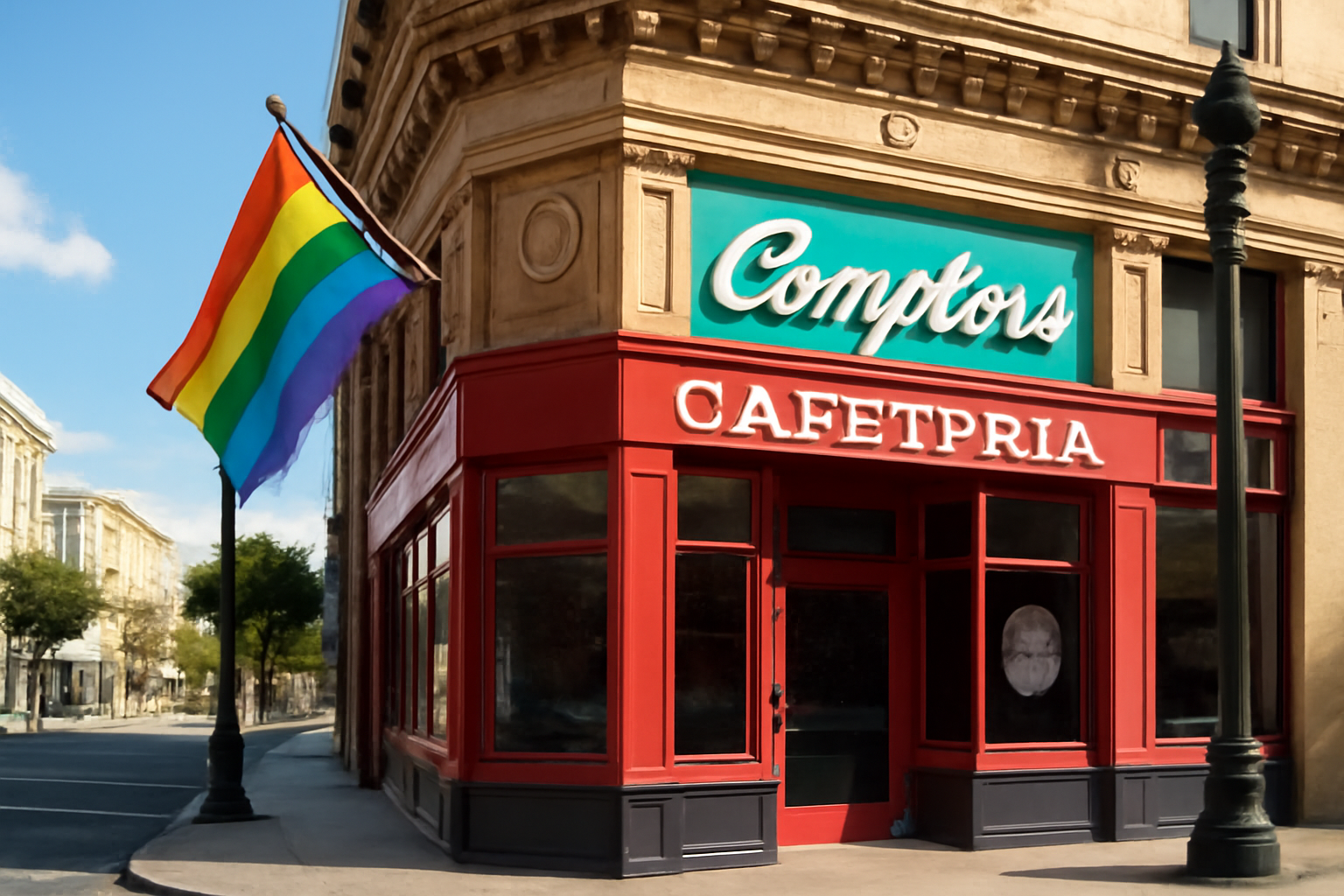
A historic San Francisco address, known for its significance in the early transgender rights movement, has been officially recognized and added to the National Register of Historic Places. This designation highlights the importance of preserving sites that have played a pivotal role in LGBTQ+ history.
Located at 101-102 Taylor St. in San Francisco’s Tenderloin district, the site was once home to Compton’s Cafeteria, where a significant pre-Stonewall transgender uprising occurred. The recognition by the National Park Service came on January 27 and marks a significant step in acknowledging the contributions and struggles of the transgender community in the United States.
The 1966 Compton's Cafeteria Riot
In August 1966, Compton’s Cafeteria was the scene of a spontaneous protest against police harassment. The riot began when a drag queen resisted arrest by hurling a cup of coffee at an officer. This act of defiance sparked a larger confrontation, resulting in shattered windows and a damaged police car. This event is remembered as a significant moment of resistance against the systemic oppression faced by transgender and queer individuals at the time.
The riot at Compton’s Cafeteria is often cited as a turning point in the LGBTQ+ rights movement, particularly for the transgender community. It demonstrated a shift towards more militant and visible forms of protest, setting the stage for future advocacy and rights campaigns across the country.
Recognition and Preservation
In 2017, the city of San Francisco designated part of the Tenderloin neighborhood as the first transgender historic district in the United States, known as the Compton’s TLGBT District, in honor of the 1966 uprising. This area serves as a cultural and historical reminder of the transgender community’s ongoing struggle for recognition and equality.
The recent addition of Compton’s Cafeteria to the National Register was largely due to the efforts of Madison Levesque, an architectural historian. Levesque initially submitted the application as part of their master’s thesis in public history, emphasizing the national significance of the site in their proposal.
“Today, the Compton’s Cafeteria riot is remembered as a turning point towards militant resistance in the LGBTQ, and particularly transgender, community,” Levesque noted in their 2022 application. The recognition of the site solidifies its importance in the broader narrative of transgender and LGBTQ+ rights in America.
Amidst Political Challenges
The recognition of Compton’s Cafeteria as a historic site comes at a time when transgender rights are facing significant political challenges. Under the Trump administration, several executive actions have been taken to undermine the recognition and rights of transgender individuals. These actions include removing references to transgender and queer identities from federal sites and resources, notably affecting the representation of such communities in historic narratives.
Despite these challenges, the acknowledgment of Compton’s Cafeteria as a historic landmark serves as a beacon of hope and resilience for the transgender community. It underscores the importance of preserving and celebrating sites that tell the stories of marginalized communities and their contributions to social justice.
Community and Cultural Impact
Susan Stryker, a noted trans scholar and historian, highlighted the significance of this recognition. “There is Stonewall and sites connected to individual people like Pauli Murray, who was nonbinary,” Stryker explained. “But this is the first thing put on the register specifically because of its connection to the history of the transgender movement.”
The inclusion of Compton’s Cafeteria on the National Register is a testament to the perseverance of activists and historians who have worked tirelessly to ensure that transgender history is acknowledged and preserved. It serves as a reminder of the ongoing fight for equality and the importance of continued advocacy and education.
As the nation grapples with questions of identity and rights, the recognition of sites like Compton’s Cafeteria highlights the need to remember and honor the struggles and victories of marginalized communities. The preservation of such sites contributes to a more inclusive and honest retelling of American history, offering a more comprehensive understanding of the diverse narratives that have shaped the nation.
Subscribe to our newsletter to stay informed about the latest developments and stories impacting the LGBTQ+ community. By staying connected, we can continue to support and celebrate the important milestones in our history.
Related Posts
Understanding Health Insurance Challenges for Transgender Employees: Legal Protections and Developments
Health Insurance Denials and Legal Protections for Transgender Employees Despite the fact that 86% of transgender Americans have health insurance, a significant number still face challenges when accessing gender-affirming care. According to surveys conducted in 2015 and 2022, about one in four transgender individuals reported being denied coverage for such care. These denials often stem from insur [...]
13 Celebrated LGBTQ+ Players to Support in the 2025 WNBA Season
The excitement's in full swing as we gear up this Friday—the 2025 WNBA season officially kicks off! The league's serving up a thrilling 44-game regular season that runs through early September, setting us up nicely before diving headfirst with gusto and passion in a playoff showdown. And guess what? The WNBA has expanded its horizons this year, now boasting 13 teams, each loaded with incredibly [...]
Celebrating Diversity: Albuquerque Pride 2025
Get ready because Albuquerque Pride 2025 isn't just another event; it's a celebration you won't want (or be able) miss! Known as a city where everyone can be themselves, Albuquerque invites people from all walks—regardless or sexual orientation or gender identity—to come together and celebrate diversity, inclusion, and love. This year's Pride festivities promise a colorful mosaic that reflec [...]